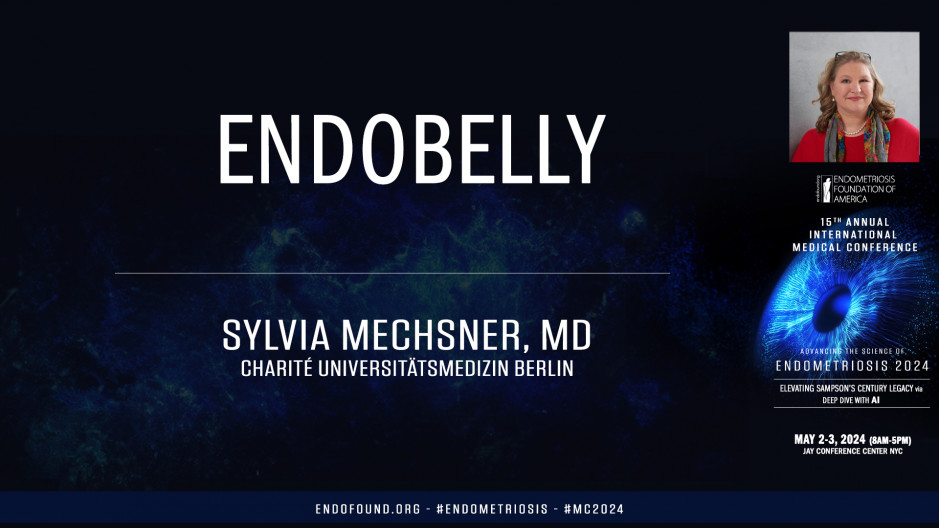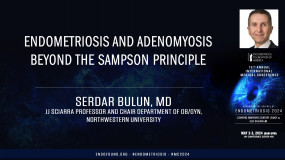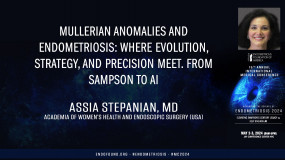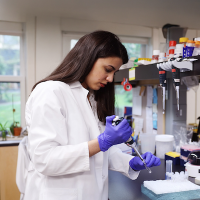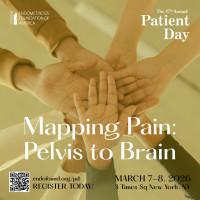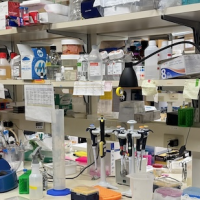International Medical Conference
Endometriosis 2024:
Elevating Sampson’s Century Legacy via
Deep Dive with AI
For the benefit of Endometriosis Foundation of America (EndoFound)
May 2-3, 2024 - JAY CENTER (Paris Room) - NYC
Your audience survey makes is my name and I want to talk to you about the belly in patients with endometriosis. These are my conflicts of interests as patients with endometriosis suffer often from unspecific bowel symptoms like cyclic criteria, constipation and cyclical bloating. All these are symptoms of IBS. Also, they suffer often from vegetative, concomitant reactions, vomiting, nausea, dizziness, stomachache and collapses. Some of my patient came and showed me this picture of their bloated abdomen and that has a very high impact on their daily life and it's also very, very painful. So they started the discussion in Germany and Europe about the Bel. They call this Bel. And we started also to think about it. What is it and why does it happen? We looked in the literature about coincidences with IBS and IBD, if there's something about the microbial, if there is something about hormones or if we have a dysfunction of the bowel wall.
The first question was if there is a connection between omes and bowel symptoms. And here this case cohort study confirms us that endometriosis patients versus non endometriosis patients have higher, more do discomfort and pain, more constipation, bloating and flatter lens infiltrative stool urgency, bowel dysfunction impaired, the daily life that is effect. And they showed a high coincidence with IBS and I. BD Keino did a review about this topic about endometriosis and IBS. They did a somatic review on the metaanalysis and as you can see here, they found a couple of publications and all these publications confirmed the status that endometriosis patients have a higher risk for IBS.
Another interesting topic is also if the bowel symptoms are caused by visceral hypersensitivity in endometriosis. And that is also an interesting study here. They investigated the pain threshold, the bowel pain threshold in patients with endometriosis and also in patients with IBS. And they used the balloon distention of the bowel to make this pain threshold measurement. The pain treasured was low in patients with endometriosis as well as in IBS patient and in correlation to control patients. So patients underwent laparoscopy and they have an exclusion of endometriosis or other abdominal pain reasons. That is very interesting and important to know that the pain is real in patients with endometriosis. It's really the visceral hypersensitivity cause of this pain in these patients. So we looked for the microbiome. If there are something different in patients with endometriosis, you know that it's a very, very complex topic and we are not able to go through all the publications about is young and all did a good summary of the data and they found or summarized that patients with endometriosis have often differences in the ratio between some bacteria in the bowel and that is different or yeah, that is different to healthy patients.
They have often a stable ratio of bacteria like fmic and bacterial eaters.
They created this pathophysiological concept and that is also very complex but also really interesting and I try to explain. So endometriosis leads to a pro-inflammatory intrabdominal milieu and this could impair the gut function and this could be a reason for dysbiosis of the bowel. So on the other hand, the dysbiosis leads also to immune dysregulation, for example, with a higher level of, equally with activation of the LPS system. That leads also to impairment of the gut function and weakened barrier function. And all these are also triggers for an activation of the innate and adaptive immunity leading also to pro-inflammatory situation in the intrabdominal cavity. Another point, and that is also very interesting is that maybe dysbiosis leads to normal estrobolome. What is the estrobolome that is are that bacteria which are able to produce estrogen and an increased estrogen level is also a trigger for endometriosis and also endometrial lesions are able to release estrogen.
So all this is then a trigger for a development of further lesions. So I think that is complex but interesting and we need to think about it bringing everything together, the microbiome, the mes, the products, the metabolic products of the bacteria, and also the estrobolome. So the release of estrogen due to biotic bacteria leads in summary to a pro-inflammatory situation. And that is, so that could be the reason and a good explanation that bowel is different in patients with endometriosis. Another point we need to regard is that the bowel activity is generally dependent. We have the motility of the bowel is regulated by an anterior nerve system and this is regulated also by sex hormones. It's sex difference. It shows sex differences and especially patients or a lot of patients, a lot of women suffer from a lightly bloated abdomen in the proliferative, excuse me, in the secretory phases of the cycle in the progeta gene dominant cycle phase.
But in patients with endometriosis it's extreme and this could be due plus neuroplastic changes in the anterior nerve fiber system. We need to think about it. Another point we try to regard if the bowel motility is different in patients with endometriosis and we found it old publication, they looked for the motility, the contractility pattern of the bowel movements in non-name patients and in endometrial patients. And as you can see here in the nonies patients, it's highly regular, very smooth pattern of the bowel function. But in patients with endometriosis is complete irregular, uncoordinated and so on. And that might be also a reason for the distension of the bowel and the high load of gas in the abdominal bowel of patients with endometriosis. Mark Noar thinking that the high levels of prostaglandins due to en metric tissue is a trigger also for this unique pattern of the bowel movements in patients with endometriosis.
Another point we need to regard is the question. If the food has an impact on the symptoms and 55% of the patients report that intake of food has an influence on endometriosis related pain and 70% they can improve the symptoms. But 30% of the patients report also that due to special things like histamine. There's also an impairment of the symptoms. 30 more than 30% of the patients suffer from allergies and food intolerances or both lactose intolerance and gluten intolerance is very common in these patients carbon at all summarized that in removal of gluten sugar and soy leads to improvement of the symptoms. Also, limited consumption is better than nothing and the supplement of vegetables, ginger and fruits leads also to improvement of the bowel situation. What is helpful, what else is helpful? We looked for other studies in looking for this criteria and this is a study done in patients with endometriosis and IBS or without and only with IBS but without endometriosis.
They included 160 patients with three criteria for IBS. 60 of them suffer from endometriosis, 100 had no endometriosis and they recommend a four weeks food met diet. It's a low carb diet and over 70% of the endo patients reported in significant improvement of the bowel symptoms in comparison to only 50% of the non metri patients. So that is something patients with endometrial uses can try, they can do by themselves and that would lead to improvement of the situation. And I think also this is a nice study looking for the nickel sensitivity in patients with the endometrial uses that reflects allergic and high or high dysregulated immune situation of these patients. And they were able to show in an open label pilot study that a low nickel diet was helpful for these patients that they have lower abdominal symptoms. We did also very small study and we recommended to try probio and in patients with bowel symptoms and in six of eight patients there was an improvement of the symptoms observed.
That is a very small unpublished study of our center. So coming to an end, the bel is a very complex situation. Endometriosis is a chronic inflammatory disease. Patients with endometriosis suffer from gastrointestinal associated symptoms. They have not yet been a focus of attention so far, both inflammatory processes as well. Gastrointestinal symptoms can be triggered by dysbiosis of the bowel, anti-inflammatory diet improves the bowel symptoms and reduces pain severity. Patients report improvement of the symptoms after the use of probio and the microbiome can play a role at different levels. But there are a lot of things for this, but we need more data. Thank you very much for your attention and I'm looking for your questions.



